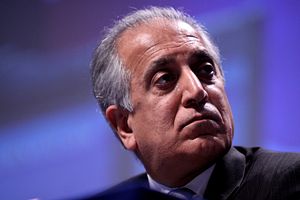American diplomats took to Twitter this week to urge the Afghan government to move ahead with prisoner releases and end the political impasse that’s resulted in parallel governments being declared by rivals Ashraf Ghani and Abdullah Abdullah.
On Wednesday, U.S. Special Representative Zalmay Khalilzad tweeted that the United States “would like to see prisoner releases begin as soon as possible in line with the U.S.-Taliban agreement. No prisoners have been released to date despite the commitment to do so expressed by both sides.”
Although the Afghan government was apprised of negotiation developments stemming from talks between the U.S. and the Taliban — evidenced by Khalilzad’s frequent stops in the Afghan capital — Kabul was not a party to the agreement settled between the two on February 29, 2020.
The agreement, officially titled “Agreement for Bringing Peace to Afghanistan between the Islamic Emirate of Afghanistan which is not recognized by the United States as a state and is known as the Taliban and the United States of America” refers to a “new post-settlement Afghan Islamic government as determined by the intra-Afghan dialogue and negotiations” but not the current Afghan government. The agreement set March 10 as a date for the start of intra-Afghan talks, but that date has come and gone without such talks beginning. The Afghan government is currently fractured in the wake of the official presidential election results, which handed the top slot to Ghani.
Khalilzad went on to tweet that time was of the essence because of the coronavirus. He noted that the United States was in consultation with the various sides and that “Technical teams from both sides can work together and focus on technical steps to begin prisoner releases as soon as possible.” The U.S. envoy stated that he would participate in the initial meetings, which would be carried out virtually, given the ongoing global pandemic. Khalilzad urged “all sides” to avoid provocative media statements. He also stated: “The Taliban commit that released prisoners will abide by the commitments made in the peace agreement and not return to the battlefield. A violation will undermine the peace process.”
But what, exactly, did the Taliban commit to in the agreement? The words “reduction in violence,” “violence” or “battlefield” do not appear in the agreement.
The four-part, three-page agreement lays out provisions for the U.S. and the Taliban, in turn, to make certain commitments. For the United States, this is a timetable for withdrawal and, for the Taliban, “Guarantees and enforcement mechanisms that will prevent the use of the soil of Afghanistan by any group or individual against the security of the United States and its allies.” After those conditions, the agreement calls for intra-Afghan talks to begin and for a permanent ceasefire to be an agenda item in those talks.
Ostensibly, the much referenced “reduction of violence” is covered by the concept of preventing the use of Afghan soil against “the security of the United States and its allies.” The Afghan government, one assumes, is an ally of the United States. But none of that is made explicit in the agreement and continued Taliban attacks on Afghan government forces suggest an alternate understanding.
The agreement’s first and second parts (listed in one order and explained in the reverse order later in the text) are interconnected and “paves the way for the last two parts,” the text states.
After laying out the U.S. withdrawal timetable, the agreement indicates the release of up to 5,000 Taliban prisoners by March 10. From the Taliban perspective, no prisoner releases means no intra-Afghan talks, and no intra-Afghan talks means no permanente ceasefire. From the Afghan government’s perspective, it wasn’t a party to the agreement, so why should it adhere to the terms?
After first balking at the the prisoner release mandate, Ghani has since committed to releasing 1,500 prisoners, gradually, but there has been a delay in deciding which prisoners to release.
A few hours after Khalilzad’s tweets, Ambassador Alice Wells, principal deputy assistant secretary for South and Central Asian Affairs, tweeted a statement from the State Department’s South and Central Asia Buraeu handle: “Afghan leaders must prioritize and protect unity of the nation. Parallel Afghan governments are not the answer, and will be harmful to the Afghan people. The impasse over governance must end.”
On Wednesday, Khalilzad reportedly met with Abdullah, but Abdullah’s deputy spokesperson said a solution to the tensions between Ghani and Abullah has not been found yet.

































